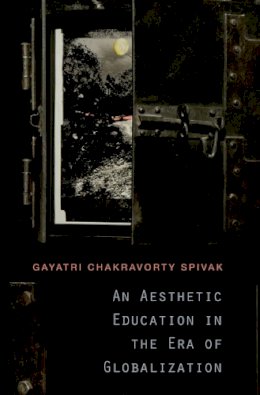
An Aesthetic Education in the Era of Globalization
Gayatri Chakravorty Spivak
During the past twenty years, the world’s most renowned critical theorist—the scholar who defined the field of postcolonial studies—has experienced a radical reorientation in her thinking. Finding the neat polarities of tradition and modernity, colonial and postcolonial, no longer sufficient for interpreting the globalized present, she turns elsewhere to make her central argument: that aesthetic education is the last available instrument for implementing global justice and democracy.
Spivak’s unwillingness to sacrifice the ethical in the name of the aesthetic, or to sacrifice the aesthetic in grappling with the political, makes her task formidable. As she wrestles with these fraught relationships, she rewrites Friedrich Schiller’s concept of play as double bind, reading Gregory Bateson with Gramsci as she negotiates Immanuel Kant, while in dialogue with her teacher Paul de Man. Among the concerns Spivak addresses is this: Are we ready to forfeit the wealth of the world’s languages in the name of global communication? “Even a good globalization (the failed dream of socialism) requires the uniformity which the diversity of mother-tongues must challenge,” Spivak writes. “The tower of Babel is our refuge.”
In essays on theory, translation, Marxism, gender, and world literature, and on writers such as Assia Djebar, J. M. Coetzee, and Rabindranath Tagore, Spivak argues for the social urgency of the humanities and renews the case for literary studies, imprisoned in the corporate university. “Perhaps,” she writes, “the literary can still do something.”
Product Details
About Gayatri Chakravorty Spivak
Reviews for An Aesthetic Education in the Era of Globalization
Shahidha Bari
Times Higher Education
Spivak is one of the most creative and influential scholars of the humanities of the past four decades; this volume shows the range and variety of her interests in topics ranging from Jacques Derrida, postcolonial studies, women in the Global South, migration in a global (arguably ‘planetary’) era, translation, and aesthetic education… She brings a profound knowledge of literary and cultural theory to her studies of ‘culture on the run, the vanishing present.’ Some of the essays here are classics, others will become so.
K. Tölölyan
Choice
[A] rewarding series of meditations on the possibility of reading, learning, and teaching that would encourage the full flowering of cultural, sexual, and linguistic diversity and resist the homogenizing force of globalization… The gathered texts are a testament to a fundamental faith in the power of literature that is never less than inspiring.
Publishers Weekly
This captivating collection of lectures delivered over the course of a quarter century asks us to attend to the profoundly democratic possibilities of the imagination. Aesthetic education empowers us to apprehend and negotiate what Spivak calls the ‘double bind at the heart of democracy.’ At a time when the humanities are expected to genuflect before the sciences and privatization and professionalization displace knowledge, Spivak urges us not only to stand tall but to insist that ethical solidarities are only possible through the rigorous training of the imagination.
Angela Y. Davis, University of California, Santa Cruz Spivak remains an indispensable leader and guide in the exhilarating conceptual adventure—the trip—which, since the late sixties, we’ve called theory. Aesthetic Education presents us with lessons that she has learnt on the way—difficult, defiant, sober lessons for these unpromising times. They demand our attention.
Simon During, University of Queensland
